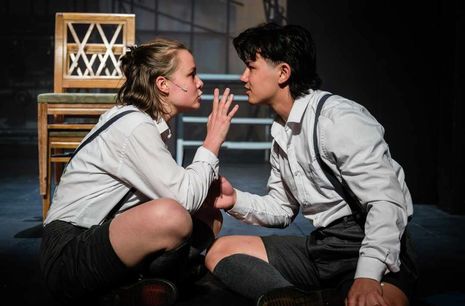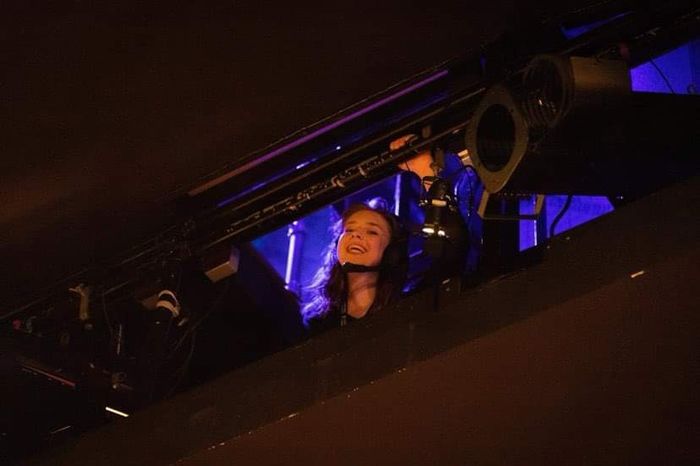Behind the Curtain with intimacy coordinators
Supriya Finch sits down for a chat about consent, kissing and choreography

When I first tossed around the idea of interviewing student intimacy coordinators, I was told by a few people that there’s no such thing. However, while some digging on Camdram revealed they’re not a myth, they are a rare breed. So, who are these elusive characters – and what do they do? To find out, I sat down with student theatre veterans Pauline Eller and Alice Roberts to discuss their time as intimacy coordinators.
Firstly I was interested in how one falls into this role, especially since it seems to be a rare skillset. Alice explained that she came across the training workshop between acting roles, while Pauline attended the same training seeking to improve her directorial skills. While there, they learned icebreakers and warm-ups designed to foster a culture of consent, along with various ways of intervening in rehearsals to make them safe, comfortable and effective.
“No one wants to be asked whether or not they want to run a kiss right in front of the person they’re supposed to be kissing”
I must admit, at first I assumed that intimacy coordinators mainly handled kissing, intimate touching, simulated sex acts and maybe nakedness. Both of my interviewees, however, were keen to contest this apparently widely-held idea. “If I could get people to take anything at all away from this, I’d encourage them to get a better baseline understanding of what intimacy is,” she said, “since so many things can get glossed over without checking in with the actors, when not everyone’s clear that even something like hand holding can count as intimacy. The ADC guidelines are so vague; they tend to use terms like ‘mild to moderate intimacy’, which could mean something different to everyone.” Citing the infamous ‘tea’ consent video, she pointed out that just because an actor has agreed to something before, doesn’t mean it’ll always be alright, and that discussing boundaries just once isn’t enough.
Both also emphasised the line between amateur and professional intimacy coordination. “I wouldn’t do anything lingering,” said Alice, while Pauline gave almost the same answer: anything more than a peck or a hug should probably be left to the pros, mostly because it’s hard for students to maintain enough professional distance from those who are essentially their peers. In fact, both expressed a desire for student intimacy coordinators to become obsolete. They explained that since the pandemic there has been a burgeoning conversation around welfare and an increase in demand for intimacy coordinators, and both admitted to feeling that directors had far too much fear of taking on a challenge; something they hope to change by handing over the appropriate skills, vocabulary and confidence to directors and actors they work with. Pauline suggested that the best approach is to stay calm, be confident and take it slow; not agonising over every last detail but also not charging into rehearsing intimate scenes without preparation. “When directors have a confident understanding of how to lay a solid groundwork of check-ins and consent culture, it allows them to proceed with their own plans without stressful decisions being thrust onto actors. No one wants to be asked whether or not they want to run a kiss right in front of the person they’re supposed to be kissing – there’s no answer that isn’t awkward!’ she joked.
“The margin for error is small, and you never want to miss anything important”
While both hoped that directors will eventually take over, reducing the enormous pressure placed on the small number of student intimacy coordinators, they empathised with directors’ reluctance: “the margin for error is small, and you never want to miss anything important”, said Alice. Nevertheless, both wanted to highlight that it doesn’t all have to be incredibly high stakes. Alice described how “working with movement directors made [her] reconsider intimacy,” teaching her to see it like a stunt or piece of choreography and making doing intimate scenes as an actor far less daunting; providing “a sort of emotional distance from the process” and teaching her she “can always say no.”
Finally, I asked them why the majority of student coordinators are women. Alice suggested that, as an actress, it can be “good to have a woman in your corner.” “Unfortunately, women seem to be significantly more likely to have a bad experience of intimacy,” she said, citing the 97% statistic, “and it can therefore be very triggering if that isn’t held firmly in mind.” Pauline concurred, suggesting the lack of male coordinators implies male students may have come to the same conclusion. However, neither wanted to exclude the possibility, praising the male instructor they met at the ADC training session and suggesting it’s probably different when it comes to the professionals.
Sadly, without the funding to run another training workshop, it seems student intimacy coordinators will have to remain the much-sought-after cryptids of the theatre world for now. Hopefully, though, this article might prove useful to those considering coordinating their own small moments of intimacy, helping them to focus on consent, empathy and safety in their practice.
 News / Clare Hall spent over £500k opposing busway 24 December 2025
News / Clare Hall spent over £500k opposing busway 24 December 2025 Comment / The ‘class’ of Cambridge24 December 2025
Comment / The ‘class’ of Cambridge24 December 2025 News / Caius mourns its tree-mendous loss23 December 2025
News / Caius mourns its tree-mendous loss23 December 2025 Comment / Yes, I’m brown – but I have more important things to say22 December 2025
Comment / Yes, I’m brown – but I have more important things to say22 December 2025 News / Girton JCR publishes open letter expressing solidarity with Palestine25 December 2025
News / Girton JCR publishes open letter expressing solidarity with Palestine25 December 2025










